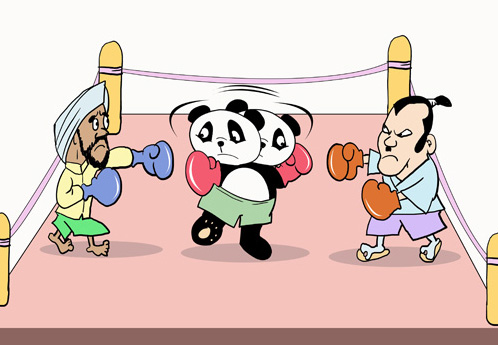Indo-Japanese relations in the post Cold-War era
 |
|
[By Li Wei/China.org.cn] |
Bilateral relations between India and Japan have developed rapidly in the last decade. The two countries entered into a de facto security alliance in 2008. Indian Prime Minister Manmohan Singh has visited Japan three times, drawing world attention to the evolving bilateral relationship.
International relations in Asia are characterized by an unprecedented buildup in the power of China, Japan and India, in the context of the continuing supremacy of the United States in the region. The core aim of India's foreign policy is to become a leading world power, and in achieving this goal it sees China's rise as a major challenge. Japan also sees China as its major security threat. In the strategic triangle among China, Japan and India, the latter two have arrived at a kind of common understanding to jointly oppose China. Another factor is that both India and Japan are "democracies" with similar political values and without any ideological barriers. Since 2009, there has been growing hysteria in India about the "China threat" and the country has moved still closer to the United States and Japan. In 2010, India's foreign policy establishment celebrated an impressive feat of achieving a breakthrough in relations with the United States and making further progress with Japan.
Current Indo-Japanese relations have the following characteristics:
Firstly, security cooperation is the core of the bilateral relationship. The year 2006 was a pivotal one for post-Cold War Indo-Japanese relations. The Chiefs of Staff of the Japanese Maritime, Ground and Air Self-Defense Forces visited India, marking a stepping up of bilateral security cooperation. On February 10, 2006, when Japan's naval chief, Takashi Saito, visited India, the two sides briefed each other on the latest developments in China's military capability, clearly demonstrating that China is a key factor driving the warming of relations between the two countries. When Indian Prime Minister Manmohan Singh visited Japan at the end of 2006, the two countries pledged in a Joint Statement on Japan-India Global Strategic Partnership that "as the largest and most developed democratic countries in Asia, the two countries not only have the responsibilities but also are capable of meeting the regional and global challenges together." This statement was a prelude to a security agreement. In October 2010, Manmohan Singh visited Japan again and the two sides signed the security agreement, which referenced the 2007 security agreement between Japan and Australia as a precedent. The agreement marked the establishment of a de facto alliance between Japan and India and illustrated the role of common political values in shaping the Asia-Pacific strategic pattern.
Secondly, the strategic coordination mechanism between the countries facilitates communication on foreign policy. As early as 2001 when India's former Prime Minister, Atal Behari Vajpayee, visited Japan, the two countries agreed to hold meetings between their foreign ministers on an annual basis. When Manmohan Singh visited Japan at the end of 2006, the two sides agreed to arrange an annual summit meeting between leaders and a strategic dialogue mechanism at the foreign minister level. When he visited Japan for the third time in 2010, the two sides agreed to launch a "2+2 dialogue" between their foreign and defense ministers.
Thirdly, trade and economic cooperation has been enhanced. Although both India and Japan have large economies, trade volume between them remains modest. In the first half of 2010, bilateral trade volume stood at just US$7.7 billion, accounting for only 1 percent of Japan's global trade. By contrast, Japan's trade volume with China, its number one trading partner, over the same period, amounted to US$176 billion. When Manmohan Singh visited Japan at the end of 2006, the two sides signed a Letter of Intent on Japan-India Special Economic Partnership, which stipulated that negotiations on a Japan-India Economic Partnership Agreement should be completed within two years. In 2010, Singh singed a free trade agreement with Japan in Tokyo.
Fourthly, the two countries have joined hands in their efforts to become permanent members of the UN Security Council. After Japanese Prime Minister Junichiro Koizumi visited India in 2005, the two countries formed the so-called "Group of Four" together with Brazil and Germany. They have jointly submitted proposals to become new permanent members of the Security Council.
India has greatly benefited from its relationship with Japan. Firstly, in terms of diplomacy, it has transformed itself from "having only one friend" to "having many friends". During the Cold War, India set great store by maintaining its traditional ties with the former Soviet Union. But after the Cold War, and especially in recent years, India has successively entered into strategic partnerships with the United States, Japan, Australia and others, greatly expanding its strategic space in the international arena. Secondly, it has reaped economic benefits. Since 2003, Japan has switched the focus of its assistance and lending programs from China to India, making India the number one beneficiary of Japan's overseas aid. Thirdly, the India-Japan engagement helps India balance China. In recent years, India has been beset with increasing suspicion and jealousy against China. But in terms of overall national capabilities, India cannot challenge China in near future. That's why India is strengthening its military capabilities, while seeking political support from major powers. Japan is, of course, an ideal choice for India. The latest evidence for this is recent joint military drills in the South China Sea.
India-Japanese relations in the post-Cold War era exemplify a famous saying of the ancient Indian strategist Kautilya: "Your neighbor is your natural enemy and your neighbor's neighbor is your friend."
The author is a columnist with China.org.cn For more information please visit:
http://www.china.org.cn/opinion/node_7078634.htm
Opinion articles reflect the views of their authors, not necessarily those of China.org.cn
(This article was translation by Luo Huaiyu.)
 0
0 







Go to Forum >>0 Comments